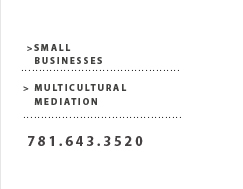






........DEFINITION
........SMALL BUSINESSES
........MULTICULTURAL MEDIATION
Multi-cultural Mediations
There seems to be no set definition of "culture", yet it is ever present in modern day society, the possibilities are endless. Culture is a group which shapes a person’s values and identity. Culture is about differentiation, which can be shown through nationality, tradition, morals, values, religious belief, customs, family and social status, and behavior and attitude, just to name a few. This "culture" is projected through everyday activity and communication, whether that is via language, food, or roles given to members in society.
Cultural conflicts arise because of the differences in values and norms of behavior of people from different cultures. A person acts according to the values and norms of his or her culture; another person holding a different worldview might interpret his or her behavior from an opposite standpoint.
This situation creates misunderstanding and can lead to conflict.
In mediation, strong consideration should be given to the cultural element of disputants, in order to maximize the mediator's understanding of the parties and the efficiency and success of the process.
It must be understood that a mediator can never be fully prepared for intercultural mediation, due to the very broad nature of culture. They can, however, take steps that will acknowledge and attempt to cater to such differences, so that the parties feel connected to the process.
The mediator in these cases will be required to educate him/herself, to determine what the major and more obvious differences are, and adjust his/her strategies accordingly.
- Algarin, Garber, Gattuso
> back to top
Three Tips for a Multi-cultural mediation
1) Retain your neutrality - Everything you say or do may be misinterpreted by either party as favoring the other. This is especially true when there are different cultures involved. The words you choose and your body language may be interpreted differently by each side. At the beginning of the process, the mediator needs to make clear what neutrality means and that if either party feels that the mediator is “taking sides” they need to inform the mediator. It is important not to say or do anything that would imply favoritism of one party.
2) Every word counts - When a mediation between two non-native speakers of the English language is conducted in English, there are many things to be aware of to make the most effective use of language. Even with the presence of simultaneous interpreters, one must be concerned with how what is said is being interpreted. Mediators should be aware of the following items:
- Be aware of the culture you are speaking to. - It helps if the mediator understands the culture a little to know how what you say may be interpreted. The best example is a Japanese person saying “yes” should be interpreted as “I have heard you” and not necessarily as an agreement to a particular statement.Use Textbook English. - Try not to use contractions, as they are more difficult to understand,Do not use idioms. - Even if the parties speak perfect English, idioms are the last element of a language people learn and they are impossible to translate.
- Write things down. - Sometimes it is easier for people to understand something in English if they see it written. Their written skills may be better than their oral skills.
3) Define confidentiality. - As a mediator, you can only guarantee your own confidentiality. Knowing that there may be different meanings of confidentiality to different groups, at the beginning of the mediation you may want to help the parties agree as to what confidentiality means and who will be allowed to share information regarding the mediation. This way, each side understands and agrees upon whom will be informed of the details of the mediation. The mediator can also help later on if one party feels that the other party has disclosed information inappropriately.
> back to top


